|
|
|
Sort Order |
|
|
|
Items / Page
|
|
|
|
|
|
|
| Srl | Item |
| 1 |
ID:
193483
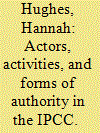

|
|
|
|
|
| Summary/Abstract |
Scholarship on global environmental assessments call for these organisations to become more reflexive to address challenges around participation, inclusivity of perspectives, and responsivity to the policy domains they inform. However, there has been less call for reflexivity in IPCC scholarship or closer examination of how routine concepts condition scholarly understanding by focusing on science and politics over other social dynamics. In this article, I suggest that scholarly reflexivity could advance new analytical approaches that provide practical insights for changing organisational structures. Through reflecting on my understanding of the IPCC, I develop actors, activities, and forms of authority as a new analytical framework for studying international organisations and knowledge bodies. Through its application, I describe the social order of the IPCC within and between the panel, the bureau, the technical support units, the secretariat and the authors, which is revealing of which actors, on the basis of what authority, have symbolic power over the writing of climate change. The fine-grained analysis of organisations enabled by this analytical framework reveals how dominance can and is being remade through intergovernmental relations and potentially, identifies avenues that managers of these bodies can pursue to challenge it.
|
|
|
|
|
|
|
|
|
|
|
|
|
|
|
|
| 2 |
ID:
105935
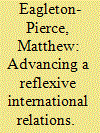

|
|
|
|
|
| Publication |
2011.
|
| Summary/Abstract |
This article advances a call for greater reflexivity in International Relations (IR) to uncover various intellectual and political biases that may obscure the research process. Inspired by existing reflexive practices in IR and, in particular, Pierre Bourdieu's use of such a method, it argues that reflexivity matters for enhancing ethically grounded research, in terms of not only the choice of subjects to study, but also how specific problems are treated, and hence what kind of results can be expected. However, the argument also goes beyond the appeal to autobiographical reflexivity to embrace other dimensions. This includes attention to institutional forces that shape the agency of the scholar and, in turn, the complex relationship between the academy and the wider political world. In the most ambitious sense, the potential for reflexivity can also be conceived collectively in terms of activist intellectuals who seek to reward reflexive practices through dialogue and political intervention. The social space of international trade politics is taken as an empirical example.
|
|
|
|
|
|
|
|
|
|
|
|
|
|
|
|
| 3 |
ID:
157590
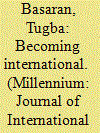

|
|
|
|
|
| Summary/Abstract |
The ‘international’ can be conceived of as a highly sought after symbolic capital. People seek to internationalise their curriculum vitae or resumes, study international subjects, get international diplomas, travel internationally, obtain international jobs. As symbolic capital the ‘international’ can be converted into ‘profit’ complementing other forms of capital (economic, cultural and social capital), deployed in struggles for social domination. It is used as a strategy of social positioning and social domination quasi-globally, but it is not recognised everywhere in the same way. We are particularly interested in the unequal distribution of this symbolic capital, the way differential conversion rates and social boundaries operate in the generation of social inequalities. For this, we will work with and against Bourdieu, in analysing the ‘international’ as a source of a highly contextual form of symbolic power, deployed in a variety of social group formations, but with uneven, differential effects, a naturalised and disguised form of domination. Ultimately, this article problematises how claims to ‘internationality’ operate in social relations and power-struggles and provides an analytical framework hereof.
|
|
|
|
|
|
|
|
|
|
|
|
|
|
|
|
| 4 |
ID:
144046
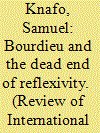

|
|
|
|
|
| Summary/Abstract |
This article examines recent attempts by International Relations (IR) scholars to flesh out a reflexive approach inspired by the work of Pierre Bourdieu. The French sociologist pioneered the idea of turning the tools of sociology onto oneself in order to apply the same grid of social analysis to the object and subject of scholarship. This represents the culmination of a long tradition of seeking to understand from where one speaks and grasp our subjective biases through reflexive means. But as I argue Bourdieu – like most reflexive scholars – largely overestimated his ability to grasp his own subject position. For he assumed he could be objective about the very thing he had the least reasons to be objective about: himself. Instead of bending over backwards in this way and directly take the subject into account, I then propose to rearticulate the problematic of reflexivity by going back to a more classic concern with the question of alienation. Through a detailed critique of Bourdieu’s reflexive approach and the ways in which it was received in IR, I set out a series of principles to reconfigure the agenda of reflexivity and offer a platform for a proper methodological alternative to positivism.
|
|
|
|
|
|
|
|
|
|
|
|
|
|
|
|
| 5 |
ID:
160874
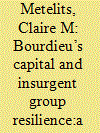

|
|
|
|
|
| Summary/Abstract |
The conflict between the rebel group, the Polisario Front, and the Kingdom of Morocco is nearing its 43rd year. Though under-reported, the conflict itself garners attention for the resilience – some would say tenacity – of the ethnically Sahrawi Polisario Front. Despite shifting regional and international politics and the nearly 150,000 Sahrawi refugees waiting in nearby Algerian camps, the rebel group has survived. What explains its resilience? This article uses Bourdieu’s ‘forms of capital’ to understand the Polisario Front’s persistence. Based on field research in Algeria, Western Sahara, and the United States, it finds that social, cultural, symbolic, and economic capital may provide an explanation.
|
|
|
|
|
|
|
|
|
|
|
|
|
|
|
|
| 6 |
ID:
154523
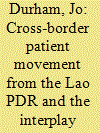

|
|
|
|
|
| Summary/Abstract |
Healthcare is most often examined within the confines of nation-states. Such an analysis, however, is not necessarily indicative of reality, with people often travelling across borders for healthcare. This paper explores cross-border travel for medical care by patients in the Lao People's Democratic Republic. The paper shows that while travelling across borders for medical care is not new, how, why and who travels across borders have changed in tandem with changes in the political and socio-economic landscape. The paper is based on a review of the literature and qualitative interviews with patients who had crossed the border for planned healthcare (N = 43), Laotian medical officials working in public institutions (N = 5) and international health advisors (N = 6). Patients came from different districts, a range of socio-economic backgrounds, had crossed borders for planned healthcare in the last two years and, based on key informant subjective assessments, were information-rich respondents. The study reveals how Lao cross-border patients creatively use the cultural and social resources at their disposal to obtain the healthcare they desire. In particular, it draws attention to the interplay between social, economic and cultural capital, and habitus in navigating access to transnational healthcare.
|
|
|
|
|
|
|
|
|
|
|
|
|
|
|
|
| 7 |
ID:
174896
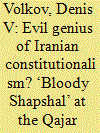

|
|
|
|
|
| Summary/Abstract |
Late Imperial Russia’s multifaceted presence in Persia retains many fascinating life-stories of its actors, who often exerted crucial influence on the course of the history of Russian-Iranian relations of the time. Drawing on international scholarship about the Russian-Iranian relationships at the turn of the twentieth century, but mostly on documents from Russian and Georgian archives and the diaries of his contemporaries as well as his own private notes, this article examines the activities of Seraia Shapshal (1873–1961), focusing on his embeddedness both in the Qajar court and in Late Imperial Russia’s policy towards Iran during the period 1900 to 1908. The paper for the first time in Iranian studies sheds light in sufficient detail upon how Shapshal found himself in Persia and what enabled him to reach the highest levels of power at the Qajar court. In so doing, it also identifies his leading role in the June 1908 anti-constitution coup.
|
|
|
|
|
|
|
|
|
|
|
|
|
|
|
|
| 8 |
ID:
185329
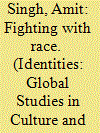

|
|
|
|
|
| Summary/Abstract |
Drawing upon ethnographic fieldwork conducted at an East London Kickboxing/Muay Thai gym, this paper explores how fighters at Origins Combat Gym seek to reject race as a discursive category in favour of constructing each other as the same, bonded by years of intimately training alongside one another. Drawing upon Bourdieu, I conceptualise a racial habitus to argue that such processes are constrained; my field-site is not a racial utopia, even if it does allow for new possibilities. Nonetheless, my interlocutors’ attempts to reject the logic of ethnic absolutism through forging complex localised solidarities offers hope in anti-immigrant times.
|
|
|
|
|
|
|
|
|
|
|
|
|
|
|
|
| 9 |
ID:
167048
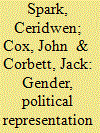

|
|
|
|
|
| Summary/Abstract |
Increasing women’s representation in national legislatures has become a priority for international organisations and aid donors in recent decades. Existing studies emphasise structural barriers, whether economic, cultural or religious, that inhibit women’s participation in the public sphere. Little attention is paid to women who defy these barriers to win election in contexts that are hostile to their presence. This article addresses this gap. Using a Bourdieusian approach, it shows how three senior women leaders from the Pacific Islands translate symbolic capital into political capital. For donors and would-be reformers, the lesson is that institutional interventions must be implemented in ways which allow women’s symbolic capital to be deployed as political capital, or which enhance women’s control of various forms of capital. This message is particularly relevant for those interested in the capacity of quotas and other temporary measures to translate descriptive representation into substantive developmental gains.
|
|
|
|
|
|
|
|
|
|
|
|
|
|
|
|
| 10 |
ID:
113856
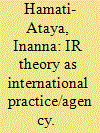

|
|
|
|
|
| Publication |
2012.
|
| Summary/Abstract |
Adopting a reflexive, praxeological understanding of science that rejects the objectivist epistemic antinomy of theory and practice, this article offers two complementary Bourdieusian readings of International Relations theory that specifically aim to conceptualise the structural position of 'periphery' scholars, as well as their extant and potential 'space of possibilities' in the discipline. Grounded in a sociological appraisal of International Relations, the 'clinical' approach objectivates International Relations as a field of international practice wherein the production of theoretical knowledge results from the meeting of different socio-academic habitus and their associated positions with the objective structures of International Relations and the international system. It highlights the relation between International Relations theory and the structural (dis)positions of its authors, the conditions that allow some theories to be objectively possible, meaningful, structuring representations of the world, and the structural constraints imposed on International Relations theorists. The 'cynical' approach suggests how a 'clinical' understanding of International Relations can help marginalised, 'periphery' scholars make sense of their 'space of possibilities' within the discipline, and develop a praxeological, reflexive attitude that could turn them into efficient international agents capable of promoting different scholarly perspectives. More specifically, the article argues that their non-native habitus is a potentially subversive capital - and hence a potential agency of structural change.
|
|
|
|
|
|
|
|
|
|
|
|
|
|
|
|
| 11 |
ID:
175125
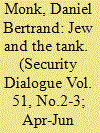

|
|
|
|
|
| Summary/Abstract |
Histories of the Arab–Israeli War of 1967 have advanced a curious commonplace. As they have sought to account for the decisive factors in what they treat as a decisive war, soldiers and interpreters of their arguments have tacitly resorted to what Adolf Loos once referred to as a ‘principle of cladding’, or bekleidungsprinzip, in order to explain the successes of Israel’s armored corps. The bekleidungsprinzip is not a military principle but a dictum of fashion, according to which the renunciation of individual affect in dress is presumed to coincide with the emergence of the qualitative advantages of the modern. With little or no explanation to substantiate the relation between dress and success in armored warfare, histories of this war have instead explained that the causes of a decisive victory may have to be found in the relation between uniforms and technical uniformity. This presupposition possesses an intellectual history, in the course of which war intellectuals repeatedly sought to reconcile what they themselves posed as a contradiction between agency and structure by identifying a proper relation between habit and habitus. Elaborated in a series of doctrinal debates concerning the proper relation of the Jew to the tank in the Israel Defense Forces – and in subsequent interpretations of those disputes – the bekleidung argument is more than a mere curiosity of military history. It points, instead, to a theodicy of conflict according to which a reification of this history’s false premises presents itself to view in repeated images of their transcendence.
|
|
|
|
|
|
|
|
|
|
|
|
|
|
|
|
| 12 |
ID:
181157
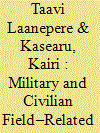

|
|
|
|
|
| Summary/Abstract |
The military service readiness of reserve soldiers is an essential question for countries that rely mostly on reserve units for their defense or other operational needs. This study examines how forms of capital related to the military and civilian fields are associated with the military service readiness of reservists. Survey data were obtained from 396 Estonian reservists during the 2018 Hedgehog exercise. Reservists’ military service readiness (RMSR) was studied first with respect to military field–related factors, and in the next phase civilian field linked factors are included. In a military field, cultural, social, and symbolic capital have a positive influence on RMSR. However, if civilian field–related social and economic capital is included, some military capitals would lose their effect. Study outcomes are discussed considering Pierre Bourdieu’s theory of the forms of capital.
|
|
|
|
|
|
|
|
|
|
|
|
|
|
|
|
| 13 |
ID:
108242
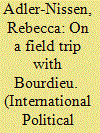

|
|
|
| 14 |
ID:
181131
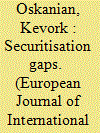

|
|
|
|
|
| Summary/Abstract |
This article contributes a securitisation-based, interpretive approach to state weakness. The long-dominant positivist approaches to the phenomenon have been extensively criticised for a wide range of deficiencies. Responding to Lemay-Hébert's suggestion of a ‘Durkheimian’, ideational-interpretive approach as a possible alternative, I base my conceptualisation on Migdal's view of state weakness as emerging from a ‘state-in-society's’ contested ‘strategies of survival’. I argue that several recent developments in Securitisation Theory enable it to capture this contested ‘collective knowledge’ on the state: a move away from state-centrism, the development of a contextualised ‘sociological’ version, linkages made between securitisation and legitimacy, and the acknowledgment of ‘securitisations’ as a contested Bourdieusian field. I introduce the concept of ‘securitisation gaps’ – divergences in the security discourses and practices of state and society – as a concept aimed at capturing this contested role of the state, operationalised along two logics (reactive/substitutive) – depending on whether they emerge from securitisations of the state action or inaction – and three intensities (latent, manifest, and violent), depending on the extent to which they involve challenges to state authority. The approach is briefly illustrated through the changing securitisation gaps in the Republic of Lebanon during the 2019–20 ‘October Uprising’.
|
|
|
|
|
|
|
|
|
|
|
|
|
|
|
|
| 15 |
ID:
113268
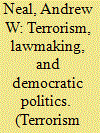

|
|
|
|
|
| Publication |
2012.
|
| Summary/Abstract |
Counterterrorist law is all too often made in a rushed, reactive, and repetitious way, marginalizing the deliberative, critical, and democratic functions of legislatures and leading to outcomes that later prove to be unconstitutional and counter-productive for public security. Using a political sociology approach, the article offers an analysis and theorisation of the practice of counterterrorist lawmaking. Through the UK example, the article argues that counterterrorist lawmaking compounds the existing unequal power relationships of the parliamentary field, and presents legislators with an inscrutable dilemma about the true stakes involved in legislative security politics.
|
|
|
|
|
|
|
|
|
|
|
|
|
|
|
|
| 16 |
ID:
157497
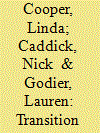

|
|
|
|
|
| Summary/Abstract |
In this article, we employ the theoretical framework and concepts of Pierre Bourdieu to examine the notion of “transition” from military to civilian life for U.K. Armed Forces personnel. We put Bourdieu’s concepts of habitus, capital, and field to work in highlighting key differences between military and civilian life. The use of social theory allows us to describe the cultural legacy of military life and how this may influence the posttransition course of veterans’ lives. There may be positive and negative transition outcomes for service personnel when moving into civilian life, and by applying Bourdieu’s theoretical concepts, we explain how such outcomes can be understood. We suggest that the “rules” are different in military environments compared to civilian ones and that service personnel must navigate a complex cultural transition when moving between environments. There are numerous and significant implications—including policy applications—from understanding transition through a Bourdieusian lens, and these are highlighted throughout.
|
|
|
|
|
|
|
|
|
|
|
|
|
|
|
|
| 17 |
ID:
143583
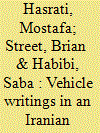

|
|
|
|
|
| Summary/Abstract |
The main objective of this paper is to problematize writings on vehicles in an Iranian context. Previous studies have indicated that vehicle stickers can be employed to express emotions and social status, political views, ideology and identity, and religious beliefs. However, very little has been done on this discursive practice in Iran. This study is the result of the content analysis of 122 vehicle writings collected from April 2011 to March 2012. This paper will draw on six of the most frequent themes: religion, humor, playing pessimism, didactic expressions, ethnic-geographic identification, and love. Employing Bourdieu's conceptual frameworks of “habitus,” “field,” and “doxa,” and Heath and Street's social practice perspective on literacy, it will be argued that vehicle writings in this study can be regarded as situated literacy practices reflecting the dominant undisputed discourses in the context, but at the same time displaying the dynamic interplay of power relations, the relationship of cultural structures and individual customized versions of those structures in vehicle writings.
|
|
|
|
|
|
|
|
|
|
|
|
|
|
|
|
| 18 |
ID:
124972
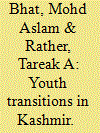

|
|
|
|
|
| Publication |
2013.
|
| Summary/Abstract |
Contemporary interpretations of youth transitions have been extensively influenced by sociological preoccupations with individualisation. Hence youth researchers have been inclined to present homogeneous and synchronised portraits of contemporary youth, skipping the crucial underlying structural features that still persist and sustain differential transitions into adulthood. Drawing on in-depth interviews with young people in Kashmir (North India), this article uses Bourdieu's conceptualisation of interdependent forms of capital to support the proposition that making rational choices and decisions, which does constitute individualisation, also still depends on one's class position.
|
|
|
|
|
|
|
|
|
|
|
|
|
|
|
|
|
|
|
|
|